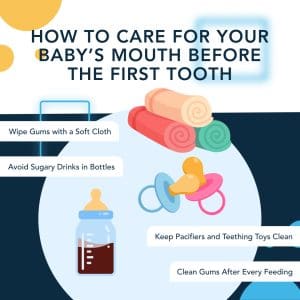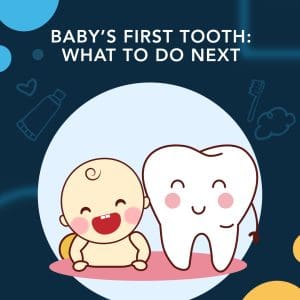Your baby’s first tooth is an exciting milestone that marks the beginning of a new phase in their development. It’s a moment of joy and curiosity, but it can also come with its fair share of challenges. From the teething process to establishing good oral hygiene habits, there’s a lot to learn as a new parent.
In this guide, we’ll cover everything you need to know, from recognizing the signs of teething to preparing for your baby’s first dental visit. With these tips, you’ll feel confident and ready to give your little one the best start for a healthy smile!
When Do Baby Teeth Typically Appear?
Baby teeth, also known as primary teeth, typically start appearing around 6 months of age, though the timing can vary. Some babies may get their first tooth as early as 4 months, while others might not see one until closer to their first birthday. These initial teeth, usually the lower central incisors, pave the way for proper chewing, speech development, and jaw alignment. By age 3, most children will have their full set of 20 primary teeth.
How to Care for Your Baby’s Mouth Before the First Tooth
Good oral care starts long before your baby’s first tooth appears. Establishing healthy habits early helps keep their gums clean and sets the stage for strong, healthy teeth as they grow. Taking simple steps to care for your baby’s mouth ensures a smooth transition when those first teeth arrive, and it builds the foundation for a lifetime of good oral health.
Wipe Gums with a Soft Cloth
Use a damp, soft cloth or a baby-specific gum wipe to gently clean your baby’s gums after feedings. This removes milk residue and bacteria, helping to maintain a healthy environment in your baby’s mouth. Establishing this routine early promotes good hygiene and prepares your baby for future toothbrushing habits.
Avoid Sugary Drinks in Bottles
Avoid giving sugary drinks, like juice or sweetened milk, in your baby’s bottle. Sugars can cling to their gums and increase the risk of early tooth decay once teeth erupt. Opt for water or formula, and never let your baby fall asleep with a bottle to prevent prolonged exposure to sugars.
Start Gentle Cleaning Habits Early
Introduce simple cleaning habits early to familiarize your baby with oral care. Use a soft cloth to clean their gums and create a calm, positive routine. Starting early makes the transition to brushing teeth easier and instills healthy habits that will benefit your baby as they grow and develop.
Clean Gums After Every Feeding
After each feeding, gently clean your baby’s gums with a damp cloth or a baby-specific gum wipe. This helps remove milk residue and bacteria that can build up, even before teeth appear. Consistently cleaning their gums ensures a healthy mouth and prepares your baby for future oral care routines.
Avoid Using Harsh or Scented Products
When cleaning your baby’s gums, stick to plain water or products specifically designed for infants. Avoid harsh or scented products, as these can irritate sensitive gums. Keeping it simple and gentle ensures your baby’s comfort and reduces the risk of introducing unnecessary chemicals into their delicate oral environment.
Keep Pacifiers and Teething Toys Clean
Pacifiers and teething toys should be regularly washed with warm, soapy water to prevent bacteria buildup. Babies frequently put these items in their mouths, making them a potential source of germs. Sanitizing these items regularly helps maintain a healthy environment and protects your baby’s gums before their first teeth erupt.
Signs and Symptoms of Teething
Teething is an exciting milestone in your baby’s development, but it can also be a challenging time for both parents and babies. As those first tiny teeth prepare to emerge, your baby may experience discomfort and changes in behavior. Understanding the signs of teething can help you provide the care and comfort your baby needs, making this important phase a little easier for everyone involved.
Increased Drooling
Teething often triggers excessive drooling as your baby’s body responds to the emerging teeth. Due to the added saliva, you may notice wet cheeks or frequent clothing changes. Keeping your baby’s face dry with a soft cloth can also prevent irritation while using bibs can help keep them clean and comfortable.
Swollen or Tender Gums
Swollen or tender gums are a common teething symptom as teeth push through the gum line. Your baby may show discomfort when their gums are touched. Gently massaging their gums with a clean finger or offering a cool teething toy can help soothe the irritation and provide temporary relief.
Chewing on Fingers or Objects
Teething babies often chew on fingers, toys, or other objects to ease gum discomfort. The pressure helps soothe sore gums as teeth come through. Always make sure the items your baby chews on are clean and safe, and consider providing teething toys specifically designed to offer comfort during this stage.
Fussiness or Irritability
Teething can make babies irritable due to gum discomfort. You might notice increased fussiness, crying, or difficulty calming them down. Providing extra cuddles, soothing distractions, or teething relief like chilled toys can help ease their discomfort and improve their mood during this challenging stage.
Changes in Sleeping Patterns
Teething often disrupts your baby’s sleep routine, as discomfort becomes more noticeable at night. Your baby may wake up frequently or have trouble falling asleep. Offering comfort, using soothing techniques, or providing teething relief before bedtime can help them (and you) get better rest during this phase.
Reduced Appetite
The discomfort of teething may cause your baby to eat less, especially solid foods, as chewing can aggravate their sore gums. Offer soft, cool foods or stick to breastmilk or formula to keep them nourished. Monitor their intake, and consult a pediatrician if their reduced appetite persists.
Baby’s First Tooth: What to Do Next
Your baby’s first tooth is an exciting milestone, but it also brings new responsibilities for parents. As that tiny tooth makes its debut, it’s time to start thinking about proper oral care and healthy habits. Taking the right steps early on will ensure your baby’s teeth and gums develop properly, setting the foundation for a lifetime of good oral health. With the right approach, caring for your baby’s first tooth can be simple and effective.
Choose the Right Baby Toothbrush
Select a toothbrush designed specifically for babies, with a small head and soft bristles to protect their sensitive gums. Look for a handle that’s easy for you to grip and maneuver. Choosing the right toothbrush ensures gentle, effective cleaning while making the experience comfortable and positive for your little one.
 Brush Twice a Day, Even if It’s Just One Tooth
Brush Twice a Day, Even if It’s Just One Tooth
Begin brushing your baby’s first tooth twice daily, once in the morning and before bedtime. Establishing this routine early helps build good habits and keeps the tooth clean. Regular brushing prevents bacteria buildup, even on a single tooth, and lays the foundation for long-term oral health as more teeth emerge.
Use a Rice-Sized Amount of Toothpaste
Apply a small, rice-sized smear of fluoride toothpaste to the toothbrush for effective cleaning. This minimal amount is safe for babies and helps protect their tooth from decay. Start early with fluoride toothpaste to build strong enamel while reducing the risk of cavities, ensuring a healthy start for your baby’s smile.
Establish a Consistent Brushing Routine
Consistency is key to building healthy oral care habits. Brush your baby’s tooth at the same times every day—morning and evening. A routine helps your baby adjust to the process and reinforces the importance of oral hygiene. Staying consistent also makes brushing a natural part of their daily schedule as they grow.
Make Brushing Fun for Your Baby
Turn brushing into an enjoyable experience by using playful songs, colorful toothbrushes, or games. Encourage smiles and laughter to help your baby associate brushing with positivity. Engaging their attention not only makes the process easier but also helps establish a lifelong love for taking care of their teeth.
Common Challenges Parents Face and How to Overcome Them
Teething and caring for your baby’s first teeth can come with unique challenges for parents. From managing discomfort to encouraging cooperation during brushing, these moments can test your patience and creativity. Understanding common hurdles and how to address them effectively can make this journey smoother.
Handling Discomfort
Teething discomfort can make your baby fussy and irritable. Offer chilled (not frozen) teething toys, gently massage their gums with a clean finger, or use a damp washcloth for relief. Avoid overusing pain medications, but consult your pediatrician for safe options if needed. Comfort and patience will help soothe your baby.
Dealing with Fear of the Toothbrush
Some babies may resist brushing due to unfamiliarity or fear. Start by letting them explore the toothbrush as a toy, and demonstrate brushing on yourself. Use a gentle approach, sing songs, or create a fun routine to make brushing enjoyable. Consistency and positive reinforcement will ease their apprehension over time.
Preventing Baby Bottle Tooth Decay
To avoid baby bottle tooth decay, never let your baby fall asleep with a bottle of milk, formula, or juice. Sugars can pool around their teeth and lead to decay. Offer water instead if needed for comfort, and clean their gums or teeth after feeding to reduce the risk of cavities.
Introducing a Dental Routine
Introducing a dental routine early helps your baby adjust to oral care. Start with simple steps, like wiping gums or brushing their first tooth twice daily. Be consistent and gentle, and incorporate fun elements like songs or games. Early routines build lifelong habits and set the stage for healthy teeth.
Unusual Tooth Placement or Shape
If your baby’s teeth appear unusually placed or shaped, don’t panic— this can be common during early development. Monitor their growth and discuss concerns with your pediatric dentist during checkups. Early evaluation ensures proper guidance and, if needed, intervention to support healthy alignment and prevent potential issues as more teeth emerge.
Preparing for Your Baby’s First Dental Visit
Your baby’s first dental visit is an important milestone that sets the foundation for a lifetime of good oral health. It’s not just about checking their teeth; it’s also an opportunity to establish a positive relationship with the Davie dentist. Preparing for this visit ensures your baby feels comfortable and helps you learn how to support their dental development effectively.
When to Schedule the First Dental Visit
Schedule your baby’s first dental visit by their first birthday or within six months of their first tooth appearing. Early visits help monitor dental development, address potential concerns, and establish good oral hygiene habits. Starting early ensures your baby gets comfortable with dental care and sets the stage for healthy teeth.
What to Bring to the Appointment
Bring your baby’s medical history, a list of any concerns, and comfort items like a favorite toy or blanket. Include any oral care products you currently use for your baby. Being prepared ensures the dentist can provide tailored advice and helps your baby feel secure during their first dental visit.
What Questions to Ask During the Visit
Ask the dentist about proper oral care routines, teething relief, fluoride use, and diet recommendations for healthy teeth. Discuss any concerns about tooth development or habits like thumb-sucking. This is your opportunity to gather guidance for ensuring your baby’s oral health as they grow and transition through dental milestones.
Schedule a Dental Checkup Appointment
Scheduling regular dental checkups with a Davie dentist is essential for maintaining your baby’s oral health. Starting early, ideally by their first birthday, allows a dentist near me to monitor tooth development, identify potential issues, and provide guidance on proper care. Routine checkups with a trusted dentist in Davie, Florida also help your baby become familiar with the dental environment, reducing anxiety in the future. Prioritizing consistent visits ensures a bright, healthy smile as your child grows. Call our office to schedule a checkup today!
January 10, 2025

 Adult
Adult




 Brush Twice a Day, Even if It’s Just One Tooth
Brush Twice a Day, Even if It’s Just One Tooth